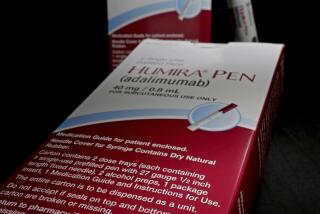Syncor Rival’s Antitrust Suit Seeks to Split Merged Firms
- Share via
Fallout from a nearly 2-year-old merger between Syncor and Nuclear Pharmacy is still raining down on Monty Fu. The deal made Sylmar-based Syncor the nation’s largest chain of radioactive-drug pharmacies, and, eventually, put Fu in charge of both firms.
The merger also made a New Mexico company very angry. Last month, Summa Medical Corp., a struggling Albuquerque company in the same business, filed a $120-million antitrust suit against Syncor, seeking to dissolve its May, 1985, merger with Nuclear Pharmacy.
The suit, pending in federal district court in Albuquerque, alleges that Syncor has systematically tried to keep 8-year-old Summa from gaining a stronger foothold in the radiopharmaceutical distribution business.
Fu, Syncor’s chairman and chief executive, called the charges “ungrounded.” He also hinted that he may countersue.
“They’re trying to corner us into a settlement, but we’re not willing to be subject to blackmail,” Fu said. “They’ve failed in the business, and now they want to blame us. It’s not our fault. It’s a crowded market, and not every player is going to make it.”
Radiopharmaceuticals are chalky, radioactive substances that are ingested or injected into patients so that doctors with special medical equipment, such as Gamma cameras, can scan the patient’s internal organs, brains or other parts of the body.
Charges of Monopoly
Summa charges that Syncor is a monopoly now because it controls 90% of the U. S. radiopharmacy market. The suit also charges that Syncor violated federal laws by providing services below cost or free to hospitals that had signed exclusive contracts to buy radiopharmaceuticals.
Nuclear pharmacies, such as those owned by Syncor and Summa, buy radiopharmaceuticals from big drug companies like Du Pont and Mallinkrodt, then act as middlemen, storing and preparing the time-sensitive products for round-the-clock delivery to hospitals and clinics.
Syncor’s success in the field dates to the mid-1970s. But its success, ironically, has inspired drug manufacturers to try to supply hospitals themselves.
Summa’s suit seeks $30 million in actual damages and $90 million in punitive damages from Syncor. The suit alleges, among other things, that last July Syncor “wrongfully, illegally and with knowledge of intent” gutted the wiring and plumbing of an Anaheim building whose lease was being turned over to Summa.
“They went in there and destroyed everything,” said Francisco Urrea Jr., Summa’s president, in a telephone interview. “It’s disgraceful.”
Used to Controversy
Controversy is nothing new for Fu, 41, the Taiwan-born chief executive of Syncor. Aside from his battle with Summa, the merger between Syncor and Nuclear Pharmacy turned out to be less than amicable.
The deal was billed as a marriage of equals, with Fu and Nuclear Pharmacy president Robert L. Sanchez sharing the chief-executive post. But Sanchez resigned four months after the merger was completed, citing a “difference in management style.”
After Sanchez left, the merged company’s name was changed from Nuclear Pharmacy to Syncor. Plans to phase out the Sylmar offices and move to Albuquerque were scuttled. .
Sanchez didn’t leave empty-handed. He sold back his 3% stake in the company at market price, close to $2.2 million. He received severance pay of $445,000, and remains in Albuquerque on the company’s payroll as a $178,000-a-year consultant until late 1988.
Urrea, who co-founded Nuclear Pharmacy with Sanchez in 1974, hasn’t been as fortunate. When Urrea left Nuclear Pharmacy in 1982 to devote his full attention to Summa, he had negotiated a contract for Summa to research a new class of injectable radiopharmaceuticals for Nuclear Pharmacy .
According to the suit, after the Syncor-Nuclear Pharmacy merger, the company refused to honor Summa’s cancer-research arrangement. Urrea said that Nuclear Pharmacy also committed itself to contribute the money necessary for costly clinical trials of the new products.
Syncor refused to put up that money, too, according to the suit. Fu says he would abide by the agreement if Summa had a new product to support.
“There’s nothing there,” he said.
The suit notwithstanding, Syncor is the IBM of the radiopharmaceutical business. Syncor operates 75 radiopharmacies in metropolitan areas throughout the United States, and had $93.6 million in sales and $1.7 million in profit for its fiscal year ended last May 31.
For the six months ended Nov. 30, Syncor reported net income of $2.2 million, or 20 cents a share, on sales of $50.3 million.
By contrast, Summa for its fiscal year ended March 31, 1986, had sales of $935,000 but a $2.8-million loss, from seven pharmacies. It has three more pharmacies under construction.
As a result of the pharmacies’ start-up costs, for the nine months ended Dec. 31, Summa reported a loss of $3.3 million, or 37 cents per share, on sales of $2.3 million.
More to Read
Inside the business of entertainment
The Wide Shot brings you news, analysis and insights on everything from streaming wars to production — and what it all means for the future.
You may occasionally receive promotional content from the Los Angeles Times.










